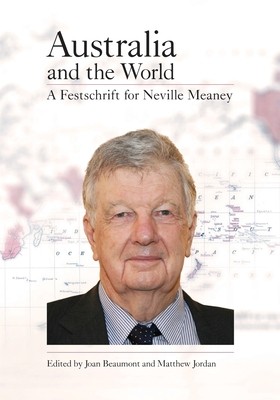
- We will send in 10–14 business days.
- Publisher: Sydney University Press
- Year: 2014
- Pages: 350
- ISBN-10: 1743320000
- ISBN-13: 9781743320006
- Format: 17.8 x 25.4 x 1.9 cm, minkšti viršeliai
- Language: English
- SAVE -10% with code: EXTRA
Australia and the World (e-book) (used book) | bookbook.eu
Reviews
Description
Australia and the World celebrates the pioneering role of Neville Meaney in the formation and development of foreign relations history in Australia and his profound influence on its study, teaching and application.
The contributors to the volume - historians, practitioners of foreign relations and political commentators, many of whom were taught by Meaney at the University of Sydney over the years - focus especially on the interaction between geopolitics, culture and ideology in shaping Australian and American approaches to the world.
Individual chapters examine a number of major themes informing Neville Meaney's work, including the sources and nature of Australia's British identity; the hapless, if dedicated, efforts of Australian politicians, public servants and intellectuals to reconcile this intense cultural identity with Australia's strategic anxieties in the Asia-Pacific region; and the sense of trauma created when the myth of 'Britishness' collapsed under the weight of new historical circumstances in the 1960s. They survey relations between Australia and the United States in the years after World War Two. Finally, they assess the US perceptions of itself as an 'exceptional' nation with a mission to spread democracy and liberty to the wider world and the way in which this self-perception has influenced its behaviour in international affairs.
EXTRA 10 % discount with code: EXTRA
The promotion ends in 22d.11:46:11
The discount code is valid when purchasing from 10 €. Discounts do not stack.
- Publisher: Sydney University Press
- Year: 2014
- Pages: 350
- ISBN-10: 1743320000
- ISBN-13: 9781743320006
- Format: 17.8 x 25.4 x 1.9 cm, minkšti viršeliai
- Language: English English
Australia and the World celebrates the pioneering role of Neville Meaney in the formation and development of foreign relations history in Australia and his profound influence on its study, teaching and application.
The contributors to the volume - historians, practitioners of foreign relations and political commentators, many of whom were taught by Meaney at the University of Sydney over the years - focus especially on the interaction between geopolitics, culture and ideology in shaping Australian and American approaches to the world.
Individual chapters examine a number of major themes informing Neville Meaney's work, including the sources and nature of Australia's British identity; the hapless, if dedicated, efforts of Australian politicians, public servants and intellectuals to reconcile this intense cultural identity with Australia's strategic anxieties in the Asia-Pacific region; and the sense of trauma created when the myth of 'Britishness' collapsed under the weight of new historical circumstances in the 1960s. They survey relations between Australia and the United States in the years after World War Two. Finally, they assess the US perceptions of itself as an 'exceptional' nation with a mission to spread democracy and liberty to the wider world and the way in which this self-perception has influenced its behaviour in international affairs.


Reviews